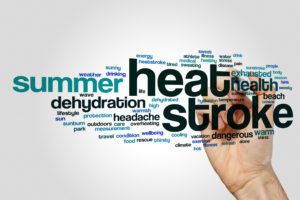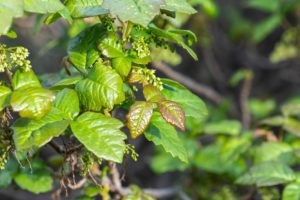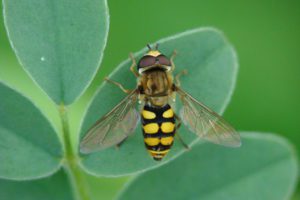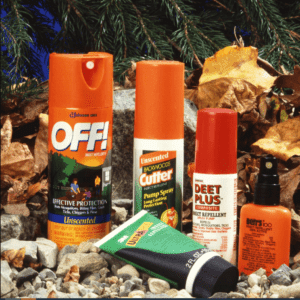By Adrian Karver, Regional Safety Manager
 Summer is here and with it comes sunshine, green grass, and blue skies. Summer also brings rising temperatures that can cause heat-related stress and an increase likelihood of contact with dangerous plants, insects, and reptiles. With our team members’ safety top of mind, here are just a few brief tips to stay safe this summer:
Summer is here and with it comes sunshine, green grass, and blue skies. Summer also brings rising temperatures that can cause heat-related stress and an increase likelihood of contact with dangerous plants, insects, and reptiles. With our team members’ safety top of mind, here are just a few brief tips to stay safe this summer:
Heat Stress
 While the three forms of heat stress often go hand in hand, there are a few differences to note:
While the three forms of heat stress often go hand in hand, there are a few differences to note:
- Heat cramps: The mildest form of heat stress in which the subject experiences muscle cramps, pain, or spasms in the abdomen, arms, or legs.
- Heat exhaustion: A condition where the body becomes overheated, during which you may experience a rapid pulse, heavy sweating, dizziness, confusion and nausea.
- Heatstroke: This is the most severe form of heat stress which causes the body’s ability to regulate its own temperature to fail completely. Symptoms include red, dry skin with no sweat, seizures, or high body temperature.
Be aware that some people are more susceptible to heat-related illness than others. If you have high blood pressure or high cholesterol, are obese or take anti-inflammatory medication for joint pain, then your risk is greater.
Prevention is key to decrease the chances of experiencing severe heat stress. Here are a few common sense tips that can help you keep your body temperature in check while working outdoors this summer:
- Stay hydrated. When working outside, make sure to drink plenty of water – about one cup every 15 minutes. If you aren’t urinating every two to three hours, you aren’t adequately hydrated.
- Avoid alcoholic and caffeinated beverages. Eliminate or greatly reduce alcohol consumption in the evening and caffeine in the morning. Both cause increased urination, which leads to dehydration.
- Eat salty snacks. Pretzels, potato chips and salted peanuts are great ways to prevent your body’s sodium from being diluted.
- Wear lightweight, loose-fitting clothing, and appropriate headwear. Baseball caps or sun hats that cover your face and neck are always a great option for protective headwear.
- Watch out for each other. Pair up with a “buddy” to remind them to hydrate and watch out for signs of heat-related illness, which can often go undetected.
If you or a coworker recognize signs of heat stress, immediate treatment measures include moving the affected person to a cool place, providing them with water or an ice pack, and in the case of heatstroke, seeking immediate emergency medical attention. Heat stress and its symptoms can lead to serious health risks, so it’s always good to familiarize yourself with the warning signs and do your part to stay safe and hydrated this summer.
Dangerous Plants
 Poison ivy, poison oak and poison sumac are all present in the markets in which we work, with poison ivy being the most prevalent. Regardless of the type, we should all do the following to reduce our risk of exposure and injury from these plants:
Poison ivy, poison oak and poison sumac are all present in the markets in which we work, with poison ivy being the most prevalent. Regardless of the type, we should all do the following to reduce our risk of exposure and injury from these plants:
- Identification: Learn to identify and avoid these plants. The oil that is released by these plants when damaged or touched is called urushiol—and just 50 micrograms (or less than one grain of salt) will cause a rash in about 80-90% of adults.
- Chemically control or remove: If you see these plants on the job, treat them chemically with herbicide. If you must clear them, do not cut or burn them (this helps spread the urushiol). Before pulling the plant, apply Ivy Block to your skin (if available), wear gloves with long sleeves tucked in, and wash immediately after.
- If exposure occurs: Immediately rinse skin with rubbing alcohol, specialized poison plant washes, degreasing soap such as dishwashing soap or detergent, and lots of water. Good products for treatment if you do come in contact and develop a rash include Zanfel, calamine lotion, or hydrocortisone cream. Wash any clothing that may have come into contact with the plant as soon as possible to avoid spreading the urushiol to other surfaces or skin. Urushiol can remain active on the surface of objects for up to five years under the right conditions.
Pests
 We share our outdoor working space with many animals, insects, and spiders. Most of them are no threat to humans, but there are some pests which we need to take precautions to avoid contact with:
We share our outdoor working space with many animals, insects, and spiders. Most of them are no threat to humans, but there are some pests which we need to take precautions to avoid contact with:
Bees, wasps, and hornets:
- If you know you have an allergy to stinging insects, take the necessary precautions (i.e. carry an EpiPen® daily).
- Be aware that nests and hives are often found in trees, under roof eaves, and on equipment such as ladders. Stinging insects typically congregate near f lowering plants, trash cans, and outdoor eating areas.
- Keep work areas free of food and open containers. Put away soda cans and leftover food to avoid attracting stinging insects.
- If a stinging insect is near you, stay calm and do not swat at it. Move away slowly.
Ticks and mosquitos:
 Use insect repellent containing 20-30% DEET on exposed skin and clothing. If the product contains permethrin (which kills ticks), spray on clothing but not on skin.
Use insect repellent containing 20-30% DEET on exposed skin and clothing. If the product contains permethrin (which kills ticks), spray on clothing but not on skin.- Avoid wearing perfumes, colognes or scented hygiene products.
- Inspect your clothes and skin daily including armpits, groin, and scalp areas for ticks.
Snakes and spiders:
- Know which venomous snakes and spiders live in your area and how to identify them.
- Wear gloves when handling brush and debris and watch where you place your hands and feet.
- If you see a snake, do not try to capture or kill it. Step back and allow it to proceed.
- If you or a coworker is bitten, take note of the color, pattern and shape of the snake or spider. If possible, take a picture of it. Being able to identify the species is key to treatment.
Proper attire and prompt attention are key. For all the above threats, the first step in prevention is proper attire. Wear a hat, a long-sleeved shirt tucked into pants, and long pants with pant legs tucked into boots. Shake out your clothes, shoes, and gloves before putting them on to be sure they are free of ticks and spiders. Shower as soon as possible after working outdoors and wash and dry work clothes at high temperatures. Inspect your body daily for ticks, mosquito bites, and poison ivy/oak/sumac. If you do come into contact and are affected by any of these pests or plants or if you start to notice symptoms of more serious conditions, alert your supervisor or seek professional medical attention immediately.
Being outside is a wonderful benefit to working in this industry. With the right knowledge, preparation, and precautions, we can do it safely and avoid the dangers of heat stress, dangerous plants, and pests. Stay safe out there!
 Use insect repellent containing 20-30% DEET on exposed skin and clothing. If the product contains permethrin (which kills ticks), spray on clothing but not on skin.
Use insect repellent containing 20-30% DEET on exposed skin and clothing. If the product contains permethrin (which kills ticks), spray on clothing but not on skin.